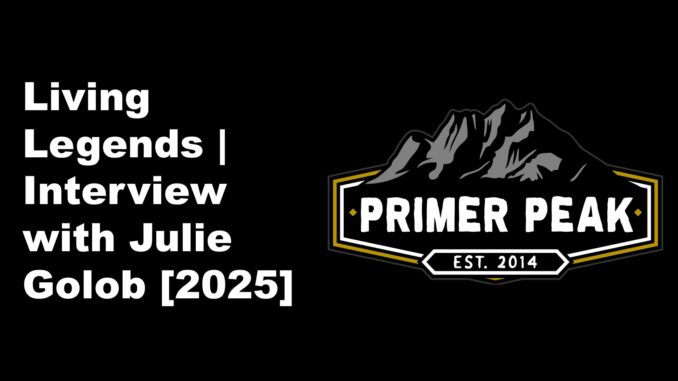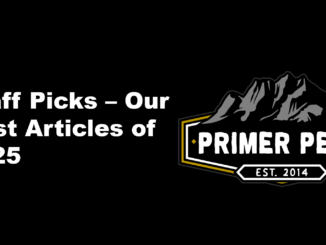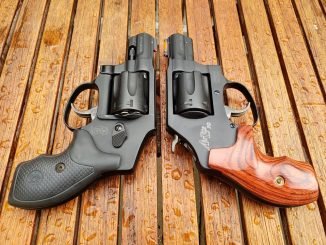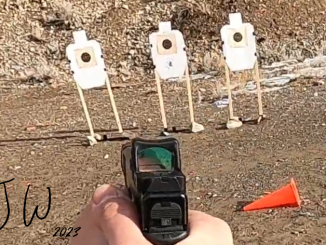
In the previous entry in this series we spoke with Rob Haught of Symtac Consulting. Today we have the opportunity to chat with veteran, competitor, and mom, Julie Golob.
Interview with Julie Golob
Julie Golob is one of the most highly decorated competitive shooters on the planet. I won’t belabor the point, but here are just a few of her accomplishments:
- US Army Athlete of the Year
- 9-Time IPSC Medalist, 5 Individual & 4 Team
- First & Only 7 Division USPSA Pistol Ladies National Champion
- 1st NSSF Woman of the Gun Award Recipient
- Action Pistol High Master, Distinguished & National Record Holder
- 50+ World & National Titles
- 170+ Major Championship Titles
In addition to her shooting accolades, Julie has been very active in the media to help spread knowledge within the firearms community. For years I’ve used her videos to help answer questions I’ve had about different forms of competition, specific techniques, and more. More recently I’ve picked up her children’s book to help introduce my child to firearms. At this year’s SHOT Show I had the opportunity to speak with Julie, and invited her to take part in our Living Legends series.
Q: We’ll start off with a little bit of your background. What first got you into guns, your professional experience, etc.
I will forever be a daddy’s girl. As his little sidekick, I went fishing, hunting, and to the range with my father. He loved to shoot all sorts of shooting sports. I first started attending silhouette competitions with him, picking up brass and being his spotter. Eventually, my dad began competing in practical shooting matches. We became a father-daughter range officer team and when I was 14 I decided I wanted to start competing too.
We prepped all winter for my first match in the summer. It took just one stage, and I was hooked! It led to traveling to my first national championships as a junior in high school and being recruited for the Army Shooting Team. I shot for the US Army Marksmanship Unit’s Action Shooting Team for nearly eight years, marking the beginning of my pro shooter/instructor career.
Q: If there was a discernable shift to “being serious” about guns, what brought that about?
I think I’ve always been serious about shooting/firearms. My dad was a school teacher, and regardless of whether my siblings and I wanted to enjoy shooting, we learned firearm safety and how to handle guns and shoot them. Perhaps because of that, I’ve always viewed firearms as tools. Whether it was hunting with my first shotgun, competing in a variety of shooting sports, or carrying a firearm, each gun I use has a purpose.
Even my “fun” guns have a role. Being exposed to shooting sports at such a young age, instead of musicians, actors, or popular athletes, my role models were competitors in the shooting sports. Watching pro shooters on the range inspired me and I knew I wanted to become one.
Q: Do you have any especially notable mentors? If so, what are some things that they did for/to you which stand out?
I’ve learned so much from shooters of all backgrounds and experience levels but I have three mentors that stand out. The first is my dad. He’s the one who sparked my interest in shooting and taught me safety and the fundamentals.
Next is Sheila Brey. She was a member of my home club and the first woman to make Master Class in the United States Practical Shooting Association (USPSA). I loved watching her outshoot the guys. She gave me countless bits of advice and helped make it possible for me to attend my first nationals.
Last and certainly not least is Rob Leatham. One of the most decorated shooters of all time, he also knows more about shooting than anyone I know. He has a distinct and special talent for evaluating students and helping them find ways to hit targets better, faster, and consistently. I learn something every time I watch him shoot or listen to him talk about shooting and guns.
Q: Tell us about any specially fond memories you have from your career, as an instructor, other firearms or defense related experiences?
Being able to share shooting and help others improve is very rewarding. There have been so many moments when I’ve been able to guide a new shooter through their fears. Offering a tip that helps a shooter struggling with a skill to improve is equally special.
My favorite memories though have to be shooting with my daughters, teaching them to shoot, and watching their excitement when they succeed is the best feeling! I now know exactly how my dad felt shooting with me.
Q: Myself and a few others found it difficult to break into the competitive shooting side of military service. Do you have any advice for young servicemembers looking to join the shooting teams of their respective branches?
Being selected to shoot for a military team is extremely competitive. The first step is knowing the criteria — what shooting sports they value, scores or classification, and experience. Offering more than just shooting performance certainly helps too. Being able to speak in front of large groups and the media, teach others well, and exceed minimum physical standards is always useful.
It’s just like any job, if you want the role or the promotion you have to work to stand out. Even outside of the military, there are extremely successful shooters at a national level who aren’t sponsored because brands get to decide who represents them. Create a resume that showcases your success on and off the range and constantly work to improve it.
Q: As new parents, my wife and I have combed through a variety of resources, and spent a lot of time working to safely integrate firearms into our growing family. Do you have any tips for parents on how to continue working on their skills, while also avoiding some of the potential hazards of training with and carrying firearms?
Congratulations! When I look back at how my parents dealt with firearm safety, hunting, shooting, and concealed carry, it was always from a place of education. Take firearm safety very seriously, be extremely deliberate when handling firearms around your family, and safely store firearms when you’re not using them.
Establish rules like you would around other dangerous objects in the home and whenever kids have questions about guns, stop and answer them. Don’t put it off. If you don’t know the answer, learn together. Show your children that you are their first resource and that you are always striving to be safe and learn about safety. I wrote a short children’s book on firearm safety and have additional free downloads on my website including a “Parent’s Guide” and “Next Steps” for anyone interested in learning more. (https://www.juliegolob.com/books/kids-gun-safety-book).

As for the training part, make time for it. That can be pretty tough with all the things we juggle as parents but it’s so important. Designate a safe area in your home where you can dry fire in a safe direction and without any ammunition around you. Take a few minutes each day or at least weekly to practice trigger control, drawing from a holster, and other gun-handling essential skills to maintain your abilities.
Talk to your spouse or significant other about ensuring you get range time as much as you both can manage. Communication and respect are key.
Q: You’re an accomplished author in the firearms realm. What advice do you have for those seeking to translate their thoughts to paper and ink?
There are so many ways people can digest information these days. From YouTube videos to quick content on social media, articles in firearms media, and blogs — it’s difficult to break through if you have aspirations of writing about guns, gear, and the shooting sports. My best advice is to write and get it out on the World Wide Web.
Whether it’s a blog, notes on social media platforms, or a substack account, there are plenty of free ways to self-publish. That way if you do decide to pursue getting a book deal or writing for gun media, you can link to your work. If you’re on social media, update your profile with details on how people can find your writing. Add that information to your email signature line.
Read and follow other writers and content creators and comment on their posts and articles in a meaningful way. Adding ways for people to discover and follow your work while engaging in the firearms community helps you get the word out and establish authority.
Q: Are there any hard lessons learned for you that changed the way you do things, or that you’d like to relay to the readers?
Put in the work. If you want to be a master class level shooter, a gun writer, an influencer, or anything else in the firearms industry, you can’t expect it to happen overnight or to be successful without making a significant effort. It’s a waste of time and mental and emotional energy to compare yourself to others. It also means there are times when your work or your efforts aren’t appreciated. Learn and move on. Do the work.
The other piece of advice I have for the especially passionate is to know when to give yourself grace. I had to learn this lesson after having my daughters. I had unrealistic expectations that I would be able to just jump back into competing at a high level. We only have so much capacity. Be kind to yourself and strive to be realistic. If you want to write a book and you’re faced with the challenge of a sick family member, adjust your timeline. If your day job requires additional overtime and you can’t get to the range, be as productive as possible but understand you may need to alter your goals.
Q: Is there anything you’d like to pass onto readers, whether they be instructors, competitors, or regular earth people?
Learn. Be a student. There’s so much I don’t know about firearms and shooting, even with decades of experience on the range and in the industry. Keep learning.
Q: Where can people find you, your work, or train with you?
The best way to keep up with me is through my website and social media. JulieGolob.com has all my social links or you can search @juliegolob on YouTube, Instagram, Facebook, Twitter, and LinkedIn. I also have a Substack with an email list where I write and share more. Thanks for having me!
Wrapping Up Living Legends Interview with Julie Golob
Whether you’re a serious competitor, parent, or just a gun owner, there’s probably something Julie has done that can help you. A big thank you to Julie for taking the time to speak with me and answer these questions!
You can check out the other interviews in this series below.
Living Legends | Interview with Rob Haught
Living Legends | Interview with Tom Givens
Support My Work
If you made it this far, thanks for reading! Writing isn’t my full-time profession, and nearly everything I do comes out of my own pocket. Between ammunition, tuition, range fees and more, expenses add up fast. If you like what I have to offer, consider making a donation to my Patreon.
Every bit helps bring more work like this to you, and contributes to shortened timelines or more in-depth work on my part. You’ll also have more direct access to me, offering suggestions for future projects, looking behind the scenes, and getting early access to some content. You can find my Patreon >>HERE<<





Be the first to comment